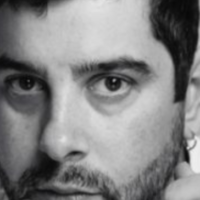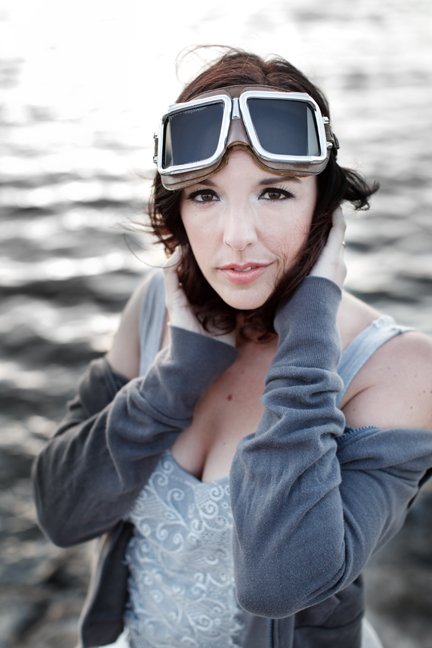Booking House Concerts
This interview was originally published in March 2014.
Shannon Curtis is a dreampop singer/songwriter and the author of No Booker, No Bouncer, No Bartender, a guide for indie artists looking to organize and book their own profitable house concert shows and tours. Shannon grew up playing the piano and singing in church and decided to professionally pursue music while earning a college degree in biology. After graduation, she and friends started a band, with which she recorded several albums and successfully toured the college market. When her band dissolved, she decided to set out on her own, touring the college market to help fund her efforts to build a new fan base as a solo artist. Shannon has been breaking new ground over the last couple years with her adoption of the “house concert” format for her touring and live shows. Over the past six years, she has released three EPs, one acoustic LP, two 10-track maxi-singles and a live album on her own small independent label Saint Cloud Records. Saint Cloud has sold over 15,000 of those records to date, and several of Curtis’s songs have been featured in TV and film, including on ABC Family’s Pretty Little Liars, ABC’s Extreme Makeover: Home Edition and MTV’s The Hills, as well as on various reality shows. She collaborates with her husband, producer/mixer Jamie Hill (Jens Lekman, Chris Bathgate, JJXO). The summer of 2014 will mark Shannon’s third summer house concert tour, which will take her to over 50 fans’ homes throughout the U.S.
Shannon discussed how she has been able to build a thriving professional career as an independent artist from the ground, up, how house concerts have helped her make truly personal connections with her fans and what led her to write No Booker, No Bouncer, No Bartender. She also shared some other creative sources of income and marketing techniques she has discovered that have contributed to her success.
MC:
Thanks for taking the time to talk, Shannon. How did you get into the music industry?
SC:
I was studying for an organic chemistry exam my senior year in college and had a moment where I thought, “I’m going to be a musician. Oh, no … How am I going to do that?”
I really consider that to be the beginning of my life as a musician. I always enjoyed music, and I grew up taking piano lessons. And I was raised in the church, so I did a lot of singing. Music was always important, but I never thought I was something a person could actually do as a career. I certainly had my music idols, but I just never conceived of the idea that it was something I could do myself. I made other plans, went to college and studied biology with the intention of going to medical school. So, that moment where I knew I was going to be a musician my senior year really scared me, because I didn’t know how I was going to actually accomplish that. When you’re planning to be a doctor – not that it’s an easy thing to do – there is prescribed path and a road map. But when you choose to be a musician, you get thrown into the wilderness. I didn’t know where to even begin.
I graduated from college and started a band with a friend. We just started writing a bunch of songs, made some demo recordings on our rudimentary 8-track recorder and tried to figure out on our own how to make our way. That band ended up recording a couple albums and touring a lot on the college circuit. I learned so much from that experience. But the band was never a full-time, money-making gig for any of us; it was more like an elaborate hobby that we were trying to nurture into a full-blown career. We all had to keep our day jobs in order to feed ourselves.
As that band was dissolving, I was writing songs that were not really in the same vein as the guitar-based rock we were playing. I was writing love songs on the piano and embarked on a solo career. And it turns out it’s not as expensive to run a solo artist’s career as it is to run an entire band. I’ve actually been able to make it work as a solo artist and was able to quit my day job back in 2008. I’ve been doing it ever since.
MC:
That’s an incredible step forward. I do a lot of product management for artists, and a lot of them have money to spend. But even with money to spend, touring is incredibly expensive. That’s where most artists dump unbelievable amounts of money. How did you successfully build up your touring base?
SC:
I’m based in Los Angeles, which is not an easy market. In fact, I very rarely play in Los Angeles. I play way more often out of town and out of state. I know a lot of people who have said, “I’m going to move to L.A. and make it in the music business.” But it’s really tough here. There are 300 shows going on at any given moment. I’ve gone out of town to foster my fan base, and it’s been wonderful, because people are very receptive and excited. I love living in Los Angeles, but everyone is kind of jaded here when it comes to music and entertainment. When you go to a club, people are usually standing there with their arms folded, maybe bobbing their heads. When I go out of town, people are a lot more welcoming.
There’s a fairly clear path that I can trace as to how I built up my touring base. It was really helpful that the band I was in did a lot of college touring, because I was able to transition into doing solo shows at colleges. I wouldn’t say college shows are fan-building shows, although they can be. But they pay well. What I did at the beginning of my solo career was work with my college booking agent to book shows that were in these far-flung places. And here’s the key: The smaller town and the farther it is off the beaten path, the more money they will pay you to come play at their school. So, I would go to these really random places to play college shows, then use that money to fund the rest of my pounding-the-pavement playing coffee houses and other places around the U.S.
MC:
And how did you get a college booking agent?
SC:
When I was in a band, we joined the National Association for Campus Activities (NACA) for the Western region. Before we joined, we were trying to book our own college shows and were able to do it successfully for a while, and then someone told us about NACA a week before the submission deadline for submission for the next regional conference. We got a showcase and went to the conference as total newbies, and ended up booking a 35-date tour in two days.
So, when I was a solo artist, I did laps around the country in my Volkswagen Jetta, playing small shows and one-by-one collecting names for my email list, using the money I made from college shows to fund that part of my touring. That’s how I was able to establish a regional then a national presence. But even in doing that, I was finding myself stymied: How do you get from doing these smaller shows to breaking into something larger? It was a really frustrating experience, and I was having trouble figuring out how to make the next leap.
Sometimes life takes you off into different directions from those you were expecting, and that was eventually what happened to me. I got an email from a fan in San Diego who said, “You haven’t been to San Diego for a while, and I think you really should come here. You can play in my living room, and we’ll accept donations for the show. It could be really fun.” I thought that sounded fun, and that San Diego was close enough to where I lived that I could probably make enough in gas money, then chalk it up to a fun experience. So, I took her up on it. And I should mention that when I travel I travel with my husband Jamie Hill, who is a music producer and mix engineer.
So, we went to this girl’s house and set up in her living room, which she had packed with all her friends. And I had the most amazing night. That show really brought me back to all the reasons I love performing music. It was a really connective, back-and-forth exchange of energy between performer and audience. It was a really “alive” experience, and I loved it. On top of that, we went home with way more than gas money in our pockets.
And we had been trying to build up the regional presence in clubs. So, we had already planned to hit one West-Coast city each month for five months. Because we had booked most of those club dates on weekends, we didn’t want to be sitting idle the rest of the time. We thought, “What if we booked more of these house concerts as filler dates?” We wanted to be productive while we were on the road.
MC:
And how did you market these shows?
SC:
I’m able to target by zip code through my mailing list. So, if I knew we had a show booked in the Seattle area, I could send a message to people within a 200-mile radius of Seattle and say, “We’re going to be in the area for these two days and are looking for a host for a house concert. Here are the requirements for hosting a show. Who’s in?” I would also post information on Facebook. We basically reached out to the community we already had in a given area to find hosts.
What we found at the end of that five-month period was that the house concerts had begun to out-perform the club shows on every level. We were making more money and gaining more genuine fans – people that would not only add their names to the mailing list but stick around and interact with us at shows and on social media, etc.
MC:
Well, and it seems like the house concert format would definitely invite that sort of engagement. You’re already in someone’s living room, so the interaction is going to be much more personal.
SC:
I think it’s just a more connective experience. We were able to grow the fan base a lot more quickly and in a more meaningful way, with people who were really invested in what I was doing musically because they had an intimate experience with me.
At the end of our five-month experiment, we realized we were really onto something with the house concerts. So Jamie suggested we put together an entire tour with just house concerts the following summer. We put the word out in March of 2012 via my email newsletter, Facebook and Twitter. I appealed to my fan base across the country and said, “If we can get enough hosts in your region, we’ll come and do it.” Within a month of putting out my first email, we had more responses from people than we could even accommodate that summer, and we had a 50-date house concert tour booked. It was the quickest booking process I’d ever experienced.
MC:
That’s pretty phenomenal. How do you vet gigs like that and make sure you’re not going to end up in the living room of, for example, someone really creepy … or that you weren’t playing to three people? Did you always pick the right shows?
SC:
Not always. One of the things about doing a house concert tour is that it’s kind of like you’re doing a trust fall every night with the host. I communicated a bunch with each of my hosts prior to the show, so I could kind of get a general vibe. And it did happen a couple times where we showed up and there were six people there, or we were in a garage. But the other moments where we had an amazing synergy with people in these homes outweighed the questionable ones. And we have a specific set of requirements that we’re getting better at implementing over time. That’s something I detail in my book, No Booker, No Bouncer, No Bartender: Make sure you communicate with your host in advance to set yourself up for success as often as you can. One of the requirements for our hosts is that they have to have a minimum number of people at the shows in order to make it happen. And we help them figure out how to get the people there, so they feel like it’s a successful event for them, too.
MC:
So, what led you to write your book about the process of booking house concerts: No Booker, No Bouncer, No Bartender? What made you think that your success with house concerts could be replicated by other musicians?
SC:
First of all, no matter what, you have to have a good product to begin with. I can’t really help other artists write great songs or be good live. If you don’t already have these things down, it doesn’t matter how closely you follow my book – you’re probably not going to have a successful experience booking house concerts.
That said, I think what makes booking house concerts work for people is that the process puts all the power in the hands of the artists. You really don’t have to wait for somebody to tell you, “You can do it.” It’s distilled down to the most basic elements of sharing music. It’s you, the performer in a space with a group of people sharing music. There aren’t any of the traditional gatekeepers to the music marketplace. You don’t need anyone to let you into the club.
If you don’t have a fan base yet, start with you family and friends. That’s how you would build normally: You ask your family and friends to come to your shows at clubs. Why not move that same concept to a house and start there? Something we experienced at a lot of our house concerts is that you can wow someone for an hour with this really intimate, connective, memorable, unique musical experience. And inevitably, a couple people there will think, “I could do this at my house.” And it will grow. For instance, we had one show in Houston, Texas that first summer in 2012. The following summer, we had three shows there, because two people at that first show decided they wanted to do it at their house the following year. It can grow in a viral way.
Start with the people who love you most. I’ve done shows at my mom’s, my dad’s and in my aunt’s backyard. They are the people that love me the most and really want to share what I’m doing with others. I think that’s a great way to start when you don’t already have an established fan base.
MC:
And as I said before, touring really is the stumbling block for so many people.
In terms of the economics of this process, do you have people pay at the door, or do you rely on merch and CD sales? How do you coordinate that part?
SC:
Figuring out these details has really been part of the learning process for us. What we’ve found is that donation-based house concerts work best for us. So, there’s not a set ticket price for the guests. In fact, there’s not even a “suggested donation.” What we’ve discovered over time is that if you tell someone a show is worth $10 or $15, they will not drop $20 or $50. So, we have hosts spread the word that the guests are invited to a “donation-based concert” with no preset expectation.
This accomplishes a couple things. First, if someone is in the midst of lean times and wants to come enjoy some music, we want them to be there. We don’t want them to stay away because they don’t feel they have an extra $10 to spend on entertainment. The bottom line is that we want to make a connection through music. And as an artist, if you make a connection with someone that is too poor to pay you in a donation one night and make them a fan, that person will get a better job next month and continue being your fan, supporting you and buying your music for years to come.
MC:
Sure. Or they’ll talk about your music to a friend that does have money.
SC:
Exactly. We just want to create a “Come one, come all” attitude for all our shows.
MC:
And when you opened it up to relying on the “cup of human kindness,” you found that brought you a better payday than just setting a limit?
SC:
Absolutely. That’s a really good way of putting it. What this boils down to – and I think the reason this has worked for us – is that it’s about connection and relationships. If you are able to capture that, it’s very valuable to people. They want to contribute to that and be a part of what you’re doing when it feels deeply meaningful to them. You establish real relationships with these people. There are no barriers in a living room that keep you separate from your audience. There are no stage lights and there is often no stage. If you’re going to do house concerts, you have to really go there and engage with people.
We’re all mass-marketed to all the time. We’re told by large corporations what we should be eating, drinking, listening to and watching all the time. House concerts are the antithesis of that experience. They are real experiences in friends’ living rooms and an opportunity to connect to a performer and be part of something really unique. I think most people want and even desperately need to be part of those types of experiences.
MC:
And we’re getting to a point where it’s a strange and unique experience to actually meet with someone without a screen separating you.
And are house concerts your primary source of income?
SC:
When you’re an independent artist, you have to have lots of different sources of income to make it work. That being said, house concerts are one of my primary sources of income, and we have a big push every year to promote them. I still also do college touring and go out two weeks in the spring and two weeks in the fall. I’m always in pursuit of music licensing opportunities, and ASCAP royalties are helpful every month. There are a lot of streams I am continually stoking. House concerts have grown as I’ve been building the rest. Looking forward, I think I will be giving them even greater focus, because they are really working.
MC:
The fact that you are able to be a full-time professional musician puts you in the top two-percent of artists. And I think it’s incredible that you’ve had such success with something as unique as house concert tours, and of course, that you’ve been able to write a book on the subject. But I’m also curious about how else you support and market your career. What other creative marketing efforts have you found to be effective?
SC:
One of the things I’ve been doing a lot over the past few years that has actually become is nice source of income for me is writing songs for my fans. They’ll hire me to write personal songs for them. I have two I need to do just this week: One for a birthday and one for an anniversary. I wrote ten songs for Valentine’s Day. It’s a lot of love songs, but you can get lost in someone else’s story for a while, and it’s something really fun. It’s fun to interact and engage with fans on a personal level and a great source of income when I’m at home and able to write and record music.
MC:
It’s similar to the patronage model or the corporate art model: Commissioning someone to play and record music.
SC:
It’s almost like a return to the Renaissance: The hosting of concerts in someone’s homes and the commissioning of works. It’s a return to older business models.
MC:
And tell me a bit more about how No Booker, No Bouncer, No Bartender came to be.
SC:
We originally conceived it as an ebook, but then we realized there were a lot of people asking for a paperback version of it, so we decided to make that available as well. The paperback version started shipping on March 17.
To learn more about Shannon Curtis and her music, visit the official Shannon Curtis website.









